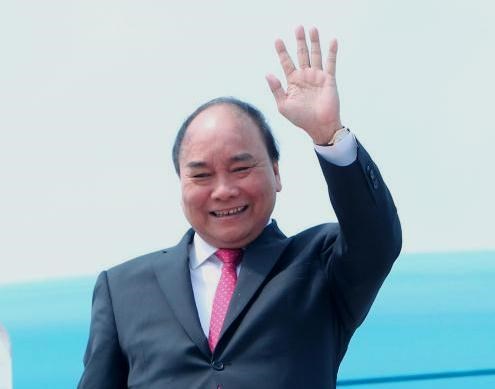    |
 |
|
Prime Minister Nguyen Xuan Phuc. Photo: NLD |
Prime Minister Nguyen Xuan Phuc, his spouse and a high-ranking delegation of Vietnam left Hanoi on October 14 morning for Vienna, Austria, to attend the 12th ASEM Summit (ASEM 12) and the Partnering for Green Growth and the Global Goals 2030 Summit (P4G).
He will also pay officials visits to Austria, Belgium, Demark and a working visit to the European Union (EU).
The visits from October 14-21 are being made at the invitations of President of the European Council Donald Tusk, President of the European Commission Jean-Claude Juncker, Austrian Prime Minister Sebastian Kurz, Belgian Prime Minister Charles Michel, and Danish Prime Minister Lars Løkke Rasmussen.
PM Phuc’s attendance at ASEM 12, P4G and his visits to Austria, Belgium, Denmark and the EU aim to affirm Vietnam’s foreign policy of independence, self-reliance, peace, cooperation and development, diversification and multilateralization of international relations, and active international integration.
The visits also convey the message of Vietnam’s extensive and extensive integration into the international community, enhancement of multilateral diplomacy, contributions to building and shaping multilateral institutions and effective participation in the settlement of global challenges at multilateral organizations.
Vietnam and EU officially set up diplomatic ties on November 28, 1990. In 1996, the European Commission (EC) set up its representative delegation in Hanoi.
The two sides have maintained cooperation mechanisms, including the annual Political Consultation at Vice-Ministerial Level; the Vietnam-EU Joint Committee; the Vietnam-EU human rights dialogue.
Vietnam and the EU have also coordinated closely at multilateral forums and international organizations, especially within the framework of the ASEAN-EU cooperation mechanism, the ASEM and the UN, in addressing global issues such as climate change, sustainable development, energy security, counter-terrorism and non-proliferation of weapons of mass destruction, and illegal migration.
In 2017, EU was the third biggest trade partner of Vietnam after China and the US, and was the second biggest importer of products from the Southeast Asian nation. Two-way trade in the year reached 50.46 billion USD, up 11.9 percent year-on-year.
In the first six months of 2018, bilateral trade hit 27 billion USD, representing an increase of 12.35 percent against 2017.
Germany, the UK, the Netherlands, Italy, France, Spain, Austria and Belgium are Vietnam’s largest export markets, with annual turnover exceeding 1 billion USD. Vietnam’s main exports to the markets are textiles and garment, footwear, coffee, seafood, computers, and phone components.
The two sides have been actively promoting the signing of the EU-Vietnam Free Trade Agreement (EVFTA) and the Investment Protection Agreement (IPA).
By the end of August 2018, 24 out of the 28 EU member nations had invested in Vietnam with 2,141 valid projects worth about 24.17 billion USD.
The EU is now the largest provider of non-refundable aid for Vietnam. In 2014-2020, the EC pledged 400 million EUR in aid for Vietnam, focusing on sustainable energy and institution. As planned, the EU will spend about 350 million EUR on supporting projects covering energy saving, renewable energy and rural electrification in Vietnam.
The EU has also decided to support the second phase of the project to develop healthcare systems towards universal health coverage in Vietnam in the 2015-2019 period with a total value of 115 million EUR. This is the EU's largest budget health assistance program in Asia.
Source: VNA